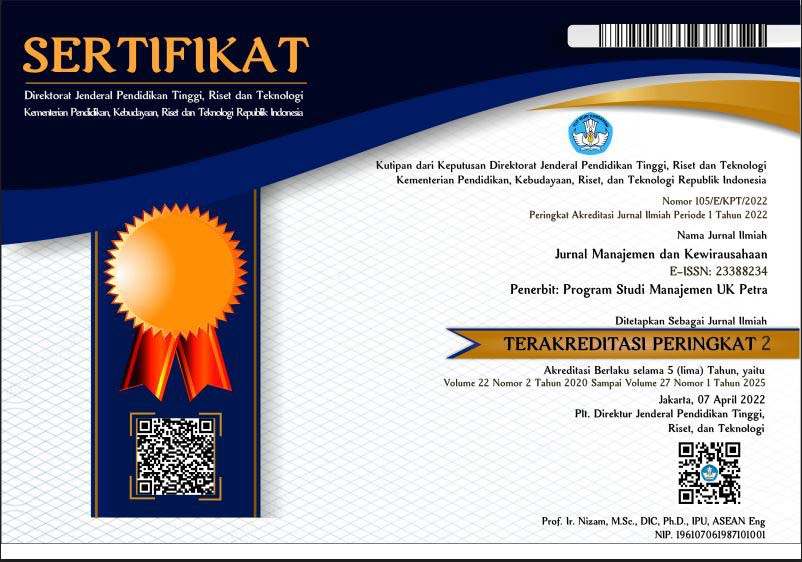MEMBANGUN INTENSI BERWIRAUSAHA MELALUI ADVERSITY QUOTIENT, SELF EFFICACY, DAN NEED FOR ACHIEVEMENT
 :
:
https://doi.org/10.9744/jmk.17.2.165-176
Keywords:
Entrepreneurial intention, adversity quotient, self efficacy, need for achieve¬mentAbstract
This study has identified the recent condition of entrepreneurial intention among one hundred and two students at fashion design school in Jakarta. Result of linier regression test showed that students’ adversity quotient can shape their entrepreneurial intention. Second, students’ self-efficacy is also shaping their entrepreneurial intention, and third, students’ need for achievement contributes in building their entrepreneurial intention. Another finding showed that students’ adversity quotient, self-efficacy, and need for achievement altogether can shape students’ entrepreneurial intention with the cumulative of 46.2%.
References
Alfiyah, N. (2012). Hubungan adversity quotient dengan prestasi belajar matematika pada siswa kelas ix smp negeri 1 tempel jurusan psikologi pendidikan dan bimbingan fakultas ilmu pendidikan universitas negeri Yogyakarta. Diunduh Maret 2014 dari http://eprints.uny.ac.id/9771/2/ BAB%202%20-%200710424409 2.pdf.
Antoncic, B., Scarlat, C. & Erzetic, B. H. (2005). The quality of entrepreneurship education and the intention to continue education: Slovenia and Romania. Managing Global Transitions, 3(2), 197 –212.
Bogan, V. & Darity, W. (2008). Culture and entrepreneurship? African American and immigrant self-employment in the United States. The Journal of Socio-Economics, 37, 1999–2019.
Constantin, D. L., Goschin, Z., & Dragusin, M. (2008). Ethnic entrepreneurship as an integrating factor in civil society and a gate to religious tolerance: a spotlight on Turkish entrepreneurs in Romania. Journal for the Study of Religions and Ideologies, 7(20), 49–79.
Flavius, T. E. (2010). Gender, entrepreneurial self-efficacy, and entrepreneurial attitude orientations: The case of the Caribbean. International Business & Economics Research Journal, 9(13), 17–31.
Fuad, N. & Bohari, A. M. (2011). Malay women entrepreneurs in the small and medium sized ictrelated business: A study on need for achievement. International Journal of Business and Social Science, 2(13), 1–7.
Gerhardt, M. W. & Kickul, J. R. (2007). The role of cognitive style and risk preference on entre-preneurial selfefficacy and entrepreneurial intentions. Journal of Leadership and Organizational Studies, 13(4), 87–104.
Ghozali, I. (2005). Aplikasi analisis multivariate dengan program IBM spss. Semarang: Penerbit Universitas Diponegoro.
Hair, J. F., Black, W. C., Babin, B. J., Anderson, R. E., & Tatham, R. L. (2006). Multivariate data analysis. New Jersey: Prentice Hall
Handaru, A. W., Parimita, W., Achmad, A., & Nandiswara, C. (2014). Pengaruh sikap, norma subjektif, dan efikasi diri terhadap intensi berwirausaha mahasiswa magister management (kajian empiris pada sebuah universitas negeri). Jurnal Paramadina, 11(2), 1046–1061.
Handaru, A. W., Parimita, W., & Subekti, W. (2013). Entrepreneurial self-efficacy, ethnicity, gender and educational background: Evidence from the kuningan international trade centre, Jakarta, Indonesia. In F. L., Gaol, S. Kadry, M. Taylor, & S. L. Pak, Recent Trends in Social and Behaviour Sciences, pp. 113–118. UK: CRC Press, Taylor & Francis Group.
Handaru, A. W., Waspodo, A., & Carolina, C. (2013). Motivational factors, entrepreneurship, gender, and parental background: evidence from the tailor’s guild at sunan giri traditional market, Jakarta, Indonesia. China-USA Business Review, 12 (6), 627–635.
Hmieleski, K. M., & Baron, R. A. (2008). When does entrepreneurial self-efficacy enhance versus reduce firm performance? Strategic Entrepreneurship Journal, 2, 57 –72.
Ismail, M., Khalid, S. A., Othman, M., Jusoff, K., Mohammed, K. M., & Shekh, R.Z. (2009). Entrepreneurial intention among Malaysian undergraduates. International Journal of Business and Management, 4(10), 54–60.
Kalyani, B. & Kumar D. M. (2011). Motivational factors, entrepreneurship, and education: Study with reference to women in sme’s. Far East Journal of Psychology and Business, 3(3), 14–35.
Kuncoro, M. (2009). Metode riset untuk bisnis dan ekonomi. Jakarta: Erlangga
Linan, F. (2008). Skill and value perceptions: How do they affect entrepreneurial intentions? International Entrepreneur Management Journal, 4, 257–272.
Linan, F. & Chen, Y. W. (2006). Testing the entre-preneurial intention model on a two-country sample. Diunduh 7 Maret 2014 dari http://www. recercat.net/bitstream/handle/2072/2213/?sequ-ence=1.
Linan, F., & Santos, F. J. (2007). Does social capital affect entrepreneurial intentions? International Advanced Economy Research, 13, 443–453.
Maysami, R. C. & Ziemnowicz, C. (2007). Ethnicity, gender and entrepreneurial tendencies: the Singapore perspective. The Copenhagen Journal of Asian Studies, 25, 1–15.
Muofhe, N. J. & Du Toit, W. F. (2011). Entrepreneurial education’s and entrepreneurial role models’ influence on career choice. Journal of Human Resource Management, 9(1), 1–15.
Rahardjo, P. & Darmawan, A. (2014). Hubungan kemandirian dan motivasi berpretasi pada intensi berwirausaha pada mahasiswa. Diunduh Maret 2014 dari http://jurnal.ump.ac.id/index.php/EKO NOMI/article/view/267.
Rahman, K. M. (2011). Entrepreneur needs and achievement of descendant latinjapanesse entrepreneurs in Japan. International Journal of Entrepreneurship, 15, 99–119.
Raposo, M. & Paco, A. (2011). Entrepreneurship education: Relationship between education and entrepreneurial activity. Psicothema, 23(3), 453–457
Scheers, L. V. (2010). The role of ethnicity and culture in developing entrepreneurs in South Africa. Problems and Perspectives in Management, 8 (4), 20–28.
Setyawan, B. N. (2009). Analisis perbedaan kebutuhan akan prestasi, afiliasi, otonomi, dominasi pada karyawan wanita dan entrepreneur wanita serta faktor yang mempengaruhi. Diunduh Mei 2014 dari http://thesis.umy.ac.id/datapublik/t1 2639.pdf.
Srimulyani, A.V. (2013). Pengaruh kecerdasan adversitas, internal locus of control, dan kematangan karir terhadap intensi berwirausaha pada mahasiswa bekerja. Widya Warta, 1, 96–110.
Sugiyono. (2013). Metode penelitian manajemen. Bandung: Alfabeta.
Sukmana, U. D. (2008). Peran pendidikan kewirausahaan dalam menumbuhkan motivasi (studi tentang pengaruh pendidikan kewirausahaan terhadap motivasi wirausaha mahasiswa universitas kuningan). Equilibrium, 4(8), 1–23.
Vemmy, S. C. (2013). Faktor-faktor yang mempengaruhi intensi berwirausaha siswa smk di Yogyakarta. Jurnal Pendidikan Vokasi, 2(1), 117–125.
Wijaya, T. (2007). Hubungan adversity intelligence dengan intensi berwirausaha studi empiris pada siswa smkn 7 Yogyakarta. Jurnal Manajemen dan Kewirausahaan, 9(2), 107–116.
Zaki, A., Fadzely, M., & Ahmed, E. M. (2006). Study of motivation in business start-ups among Malay entrepreneurs. International Business & Economics Research Journal, 5(2), 103–112.
Downloads
Published
How to Cite
Issue
Section
License
Authors who publish on this journal agree to the following terms:
- Authors retain copyright and grant the journal right of first publication with the work simultaneously licensed under a Creative Commons Attribution License that allows others to share the work with an acknowledgement of the work's authorship and initial publication in this journal.
- Authors are able to enter into separate, additional contractual arrangements for the non-exclusive distribution of the journal's published version of the work (e.g., post it to an institutional repository or publish it in a book), with an acknowledgement of its initial publication in this journal.
- Authors are permitted and encouraged to post their work online (e.g., in institutional repositories or on their website) prior to and during the submission process, as it can lead to productive exchanges, as well as earlier and greater citation of published work (See The Effect of Open Access).

















